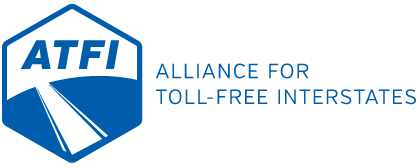The $478 billion transportation bill that the Obama administration sent to Congress this week is reigniting a debate about increasing the use of tolls to pay for new infrastructure projects.
For the second year in a row, the administration included language in its infrastructure plan that would lift the ban on states placing tolls on existing highway lanes.
The anti-tolling Alliance for Toll-Free Interstates (ATFI) said Obama’s tolling proposal, part of a larger draft dubbed Grow America Act 2.0, should be a nonstarter with lawmakers.
“The recycled plan to lift the ban on tolling existing interstates has aged horribly in the year since it was first offered,” ATFI spokesman Julian Walker said in a statement to The Hill.
“Tolling interstate lanes which drivers now freely access is an inefficient financing mechanism that is the worst possible approach to raising transportation revenue,” Walker continued. “The idea has already been rejected by lawmakers, the public, and community leaders in the few states with a federal exception to the tolling prohibition.”
The administration's proposal calls for spending nearly $80 billion per year on the boosting the nation's infrastructure, which would be an approximately $30 billion annual increase over current spending.
The proposal relies largely on funding it says can be drawn from taxing corporate overseas profits, but it would also allow states to apply to the Department of Transportation for approval to install additional tolls on existing roads. Current law requires states to construct new lanes on highways that they want to add to tolls to.
Tolling advocates called the Obama administration’s proposal to take steps to ease the restriction “bold.”
The International Bridge, Tunnel and Turnpike Association (IBTTA) said the change would “give states greater flexibility to meet their challenging infrastructure and surface transportation needs.”
“IBTTA fully supports the administration's proposed requirement that any new toll facilities on Federal-aid highways use non-cash all electronic tolling as of October 1, 2016," the group’s executive director Patrick Jones said in a statement.
Opponents of boosting the use of tolls on U.S. highways offered a different take.
“Tolls … divert heavy highway traffic onto secondary streets, which leads to premature road breakdown that costs local taxpayers, and they endanger public safety when rescue workers are delayed in responding to emergencies,” the ATFI’s Walker said.
“This plan would also let states redirect toll revenues to completely unrelated projects, abusing public trust and exploiting highway drivers with a tax on interstates to pay for trolleys, public transit, and unspecified environmental projects, all without solving the transportation funding problem.”
The Obama administration included the tolling proposal in a $302 billion transportation bill it sent to Congress last year, but the measure was largely ignored by lawmakers.
The administration's new draft is intended to help beat a deadline for the expiration of transportation funding that is scheduled for May 31. The bill attempts to address a shortfall that is estimated to be about $16 billion per year.
The Department of Transportation has said its Highway Trust Fund will run out of money if lawmakers do not act to replenish it. The agency has said that it will have to cut back on reimbursement payments to state and local governments for transportation projects that are already on the books in the event of a shutdown.
Lawmakers in both parties have expressed a desire to prevent an interruption in transportation spending, but consensus about how to pay for such an extension has been elusive.
The traditional source of transportation funding has been the 18.4-cent-per-gallon federal gas tax that was established in the 1930s. The tax has not been increased since 1993, and improvements in car fuel efficiency have greatly sapped its purchasing power.
The federal government typically spends about $50 billion per year on transportation projects, but the gas tax only brings in $34 billion.
Lawmakers have turned to other areas of the federal budget in recent years to close the gap, but transportation advocates said the patches make it difficult for states to plan long-term construction projects that are badly needed.
The bulk of the funding in the administration's proposal comes from taxing corporate overseas profits. The proposal, known as repatriation, would require companies to bring back earnings to the United States at a 14 percent tax rate, generating an estimated $238 billion in revenue for the government.
Most transportation advocates have pushed for a gas tax increase to solve the infrastructure funding problem, but lawmakers have been reluctant to ask drivers to pay more at the pump.
Conservative groups say they would consider a gas tax hike a tax increase, and most Republicans oppose it.
Transportation advocates say a shutdown would cost the nation thousands of jobs, because May is typically the beginning of the busy summer construction period.

